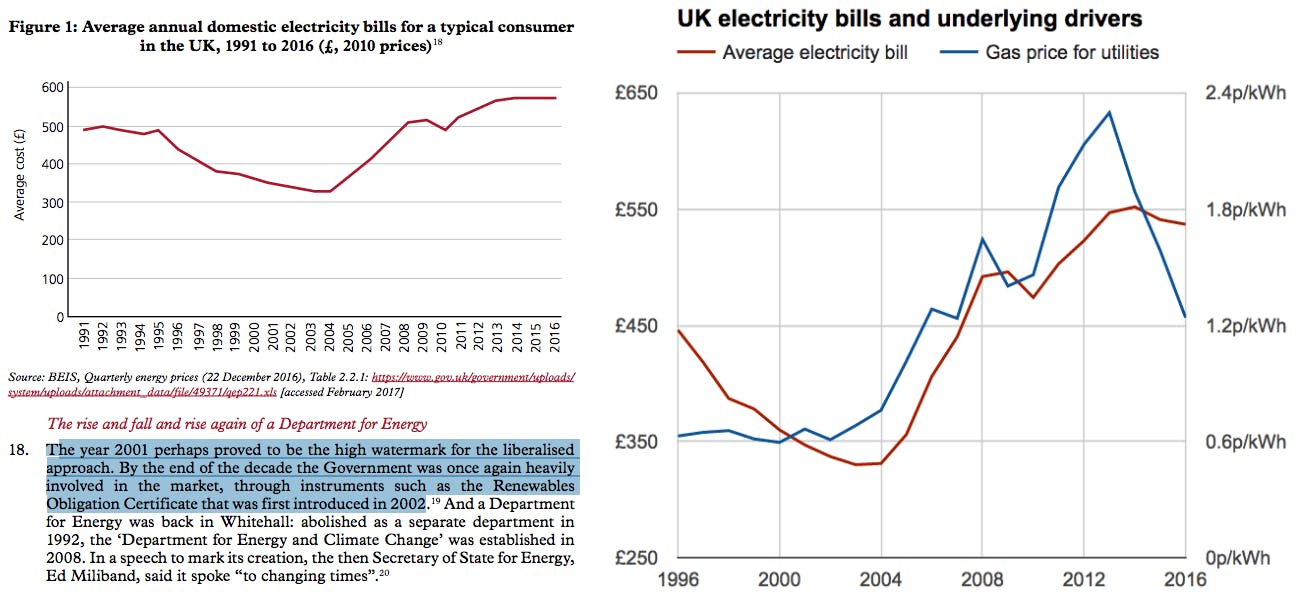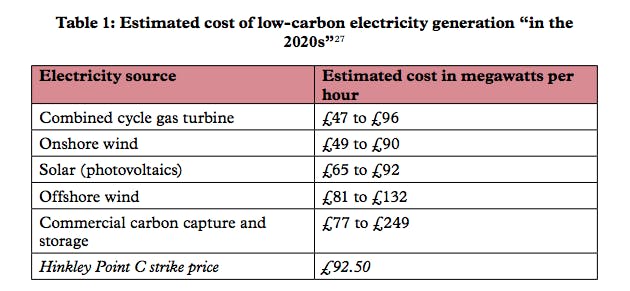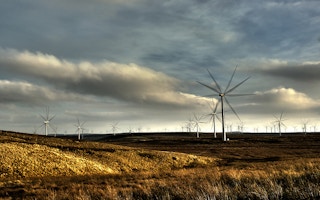If the UK is to fix these problems, the committee says, it should put energy security first, move to competitive auctions for electricity and “vary” the pace of greenhouse gas emissions reductions. Though it does not say so explicitly, it appears to favour a slower pace of cuts.
Carbon Brief unpicks the committee’s report with the help of several climate and energy policy experts. They describe it as “confused”, lacking nuance and “very disappointing”. Others say the report summary is “very misleading” and the proposed auction “doesn’t really make sense”.
Market reforms
The report begins by recalling a 1982 speech by Nigel Lawson, then the energy minister, setting out a “liberalised vision” of competitive energy markets that was being “embraced” by all. The committee’s citation for the speech is a 1989 book by the economist, Dieter Helm.
Helm, a professor of energy policy at the University of Oxford and Lawson, a former chair of the Lords committee and now chair of the climate-sceptic Global Warming Policy Foundation, were the first two people to give evidence to the Lords’ inquiry.
They are also the two most frequently cited names in the report and, as a result, their testimony heavily influences the report. Helm’s name appears 29 times, more than twice as often as any other.
The report goes on to recount how energy policy has changed since the pro-market reforms that Lawson introduced. In subsequent years, the committee says, efforts to tackle global warming have improperly taken precedence over security of supply and affordability.
It argues that the “overarching aim of energy policy must be to keep the lights on” and that other considerations should not stand in the way of this goal. (The report notes: “We take as a given that the UK will remain committed to reducing carbon emissions.” But it noticeably doesn’t say whether it supports this objective.)
“
Innovation in policy thinking, and literally in technological innovation, should push to secure our objectives in a way that has high regard to the current and future costs of energy.
Greg Clark, secretary of state for business, energy and industrial strategy, UK
It says that the Climate Change Act and its legally-binding carbon targets have taken precedence. It cites several policies supporting low-carbon electricity as “examples where the trade-off between objectives has come down on the side of decarbonisation”.
This reductive, zero-sum view of the balance between energy security, decarbonisation and affordability was challenged directly by Greg Clark, the current secretary of state for business, energy and industrial strategy. Giving evidence to the committee, Clark said:
“I completely agree with you that security of supply is indispensable. We need that. I regard the best way of approaching the others, not so much as a series of trade-offs, but as an invitation to see how we can solve them as simultaneous equations rather than separate ones where we regard them as inevitably compromising on one rather than the other. That can be hard.
“The easiest thing is to say, ‘We will do a bit more of this and a bit less of that’. It seems to me that innovation in policy thinking, and literally in technological innovation, should push to secure our objectives in a way that has high regard to the current and future costs of energy and the fourth aspect that I have introduced, which is to consider whether there might be scientific and industrial opportunities for us.”
Margin call
The committee goes on to say that the focus on decarbonisation has left energy bills rising and electricity supplies perilously insecure. It says, for instance:
“The growth of renewable energy, supported by contracts that guarantee a given price for a fixed period, has left the UK facing a possible shortage of capacity…The UK currently has a slim capacity margin…The increased amount of electricity generated from intermittent sources [such as wind and solar] presents new challenges for security of supply.”
In fact, while electricity supplies are tight, the government has put a series of policies in place to ensure capacity remains sufficient. As a result of these policies, Steve Holliday, who used to run the UK’s National Grid, recently said the time to fear blackouts was over.
Jon Ferris, strategy director at consultancy Utilitywise, tells Carbon Brief: “To ask if there is sufficient capacity to meet demand betrays the outdated view that demand is inflexible [and], therefore, generation must exceed peak demand.”
Michael Liebreich, founder of Bloomberg New Energy Finance, tells Carbon Brief:
“If the committee were looking only at 2017’s slight shortage of generating capacity, the report would be perfectly fine. Since its remit was the UK’s need for affordable, reliable, clean power over coming decades, the report is very disappointing.”
“Energy is a hugely complex area of policy-making, and I am afraid I would have hoped for a much more nuanced and forward-looking report.”
Liebreich adds:
“The committee appears to have decided that the biggest risk to the UK power grid’s reliability comes from the variability of renewable energy – despite accepting that the cost of managing this variability would add ‘certainly less’ than 1p per kWh to power prices.”
You can read more on this issue in a recent in-depth Carbon Brief article on the whole system costs of renewables.
“
If the committee were looking only at 2017’s slight shortage of generating capacity, the report would be perfectly fine. Since its remit was the UK’s need for affordable, reliable, clean power over coming decades, the report is very disappointing.
Michael Liebreich, founder, Bloomberg New Energy Finance
Juxtaposed
Similarly, the committee blames decarbonisation for rising energy bills. In order to make this link without saying it directly, the report repeatedly juxtaposes the issues. To take just one of several examples, the summary says:
“To reduce carbon emissions, governments have subsidised renewables, passing on the cost to consumers in their electricity bills. The average domestic electricity bill was 58 per cent higher in 2016 than it was in 2003.”
This passage omits four crucial pieces of context. First, 2003 seems to have been chosen only because it had the lowest prices. Second, taking a longer term view, bills were only 20 per cent higher in 2016 than they were in 1996, after adjusting for inflation.
Third, average electricity use is falling, offsetting some of the increase in unit electricity prices, whereas those 20 per cent and 58 per cent rises assume constant demand. Total consumer spending on electricity has fallen by 16 per cent since a 2004 peak and is 7 per cent below 1997 levels, the first year reported.
Finally, as the report belatedly acknowledges: “This increase [in bills] has been mainly driven by rising international prices for fossil fuels.” You can see this clearly, along with another example of the report’s use of strategic juxtaposition, in the figure below.

Left: Average domestic electricity bills in the UK, 1991-2016, assuming constant usage (£, corrected for inflation). Source: House of Lords Economic Affairs Committee. Right: The same average domestic bill data (red) plotted against the gas price paid by electric utilities. Source: Department of Business, Energy and Industrial Strategy. Chart by Carbon Brief.
There is no question that carbon, energy efficiency and fuel poverty policies are adding an increasing sum to electricity bills. As the Lords report says, however, these policies made up 10 per cent of bills in 2014, a share that is expected to rise to around a quarter by 2020. Note, again, that these figures exclude savings on bills due to energy efficiency policy.
Low carbon
Elsewhere, the report says that: “The generation of electricity from fossil fuels is cheaper than renewable sources…[It] has always been, and remains cheaper.” This statement excludes both the cost of CO2 emissions and the “dramatic recent fall” in the cost of wind and solar power, which is acknowledged elsewhere in the report.
Ferris tells Carbon Brief: “To state that fossil fuels remain cheaper than renewables ignores both recent cost reductions and the cost of carbon.” The report includes the following table, which incorrectly labels gas as a source of “low-carbon electricity generation”.

Source: House of Lords Economic Affairs Committee.
Several recent reports, including from the Department of Business, Energy and Industrial Strategy (BEIS) and the Committee on Climate Change, have found that renewables will be the cheapest forms of new electricity generation in the 2020s. Unlike gas, they are also low carbon. This contrasts to the committee’s chart, shown above.
Despite noting the dramatic pace of cost reductions for renewables and the rapid progress that has seen them reach a quarter of UK supplies, the committee singles out the pace of decarbonisation in the electricity sector as an area of particular concern.
It says, correctly, that the UK will not meet its 2050 carbon target without “substantial progress” on decarbonising heat and transport. It then says government should “use the powers provided by the Climate Change Act to vary the required pace of emissions reductions in the electricity supply”.
In fact, there is no “required pace” for electricity. Instead, there is an economy-wide carbon target. Moreover, measured CO2 emissions from electricity generation are not actually counted under UK carbon budget accounting rules. This earlier Carbon Brief article has more details.
On the Paris Agreement, the report emphasises that there is “no legal requirement” for nations to meet their climate pledges. It fails to note that the Paris aims are more ambitious than those on which the UK’s carbon budgets were set. It also incorrectly quotes the Paris legal text wording on 1.5C.
Finally, it says no “robust” evidence has been collected on emissions being exported to other countries and calls for the government to conduct and publish relevant analysis. In fact, such analysis is already being published by government, though it has stopped funding the work.
All in all, the report’s arguments around the UK’s legally binding carbon budgets are “sloppy” and “confused”, says Jonathan Church, a lawyer at legal NGO ClientEarth. Church tells Carbon Brief:
“The report seems to paint the Climate Change Act as part of the problem and a cynic would say it is seeking to relax our efforts to cut carbon. There is also an insinuation that the Paris Agreement might somehow open the door to weakened UK targets. But the only question arising from Paris is when and how we increase our domestic ambition to bring it in line with the new global targets.”
Indeed, the CCC has been clear that existing carbon budgets should not be weakened and that the UK will, ultimately, have to set a date to reach net-zero emissions. The government has agreed.
In his evidence to the committee, secretary of state Clark said:
“The response from industry when we introduced and took through parliament the fifth carbon budget was pretty positive…Not just the usual suspects, but the engineering employers, for example, who represent some of the energy-intensive users, commended the adoption of the fifth carbon budget for the purpose of knowing what the trajectory would be so that industry could plan ahead.”
The video above was produced by the Lords committee to promote its report.
Unified auction
One of the committee’s key recommendations is a single, technology-neutral auction for electricity, which would replace all other existing policy interventions in the electricity market, from subsidies for low-carbon power to the capacity market designed to secure sufficient supplies.
Dr Rob Gross, director of the UK Energy Research Centre, tells Carbon Brief:
“This is basically a variation or, more accurately, a corruption on Dieter Helm’s proposal from a couple of years ago…As described, it doesn’t really make sense.”
There is “not enough information”, Gross adds, to understand if the auction is supposed to buy enough capacity to cover the hours of peak demand in winter (in gigawatts), or if it would buy enough electricity to cover the UK’s supplies for a year (in gigawatt hours).
Richard Howard, head of energy and environment at thinktank Policy Exchange, agrees that it is “not particularly clear” if the auction would be for capacity or generation. He tells Carbon Brief: “I think it’s a good idea, in theory, but, in practice, it would throw up a lot of complexities.”
Difficulties would include agreeing on uncertain, subjective and changeable system integration costs, Howard says, as well as the need to recognise and reward system flexibility.
“
This is basically a variation or, more accurately, a corruption on Dieter Helm’s proposal from a couple of years ago…As described, it doesn’t really make sense.
Rob Gross, director, UK Energy Research Centre
Jon Ferris, strategy director at consultancy Utilitywise, tells Carbon Brief:
“Neither [the committee nor Helm’s] auction proposal will lead to the lowest cost, secure low carbon electricity system, and either risks locking the UK into an unnecessarily high-cost approach that also restricts the opportunity to grow the market for flexibility.”
“We do not have a capacity problem, we have a flexibility problem, and this generation-focused approach not only ignores that flexibility can and will increasingly be provided by other means, but will restrict UK participation in a growing global market.”
The auction would be administered by an independent Energy Commission, the Lords report suggests, which would also be responsible for running an expanded energy research and development budget.
Tom Edwards, a senior consultant at consultancy Cornwall Energy, tells Carbon Brief:
“We agree wholeheartedly that low-carbon and capacity security need to be looked at holistically and not in isolation. The key will be in designing a suitable scheme that can consider differences between the demand side, existing generators and new build, as well as effects on long-term system stability from different technologies…It would be an incredibly complex piece of work.”
Edwards also questioned the idea of making renewables carry the cost of system reserves. He says: “This doesn’t consider the reasons National Grid carries reserve, which is to deal with more than just intermittent generators i.e the largest infeed loss into the system (currently nuclear).”
Conclusion
The House of Lords Economic Affairs Committee report says energy policy is beset by failure. It laments the rise of government intervention and harks back to the age of privatisation and long-lost competitive energy markets.
This nostalgic view, which suffuses the report, was noted by several of the experts contacted by Carbon Brief. One said the report reminded them of a Douglas Adams rule on reactions to technology. This says: “Anything invented after you’re 35 is against the natural order of things.”
Liebreich tells Carbon Brief:
“[The committee] has decided that all energy technology innovation happens in labs – despite seeing how scale, industrial learning, and cheap finance have driven down costs to the point where wind power is the cheapest form of new electricity in the country. And it has decided that the best way to solve forward is top-down central planning of capacity – despite the fact that this will suppress innovation and support outdated fossil fuel generators.
“There is an accelerating nexus between the UK’s power, heating and transportation systems. New digital technologies – many of them pioneered here in the UK – enable radically more efficient [energy] system architectures and control paradigms.”
Other commentators had a similar take on the report. In a statement, Paul Massara, CEO of North Star Solar and former CEO of RWE npower, said the Lords had produced a “backward-looking report with many out-of-date claims”. He added:
“What the committee doesn’t seem to understand is the wholesale transition that our energy system, like those of other countries, is undergoing. We’re rapidly moving towards a smart, flexible grid dominated by clean sources of energy, and employing new technologies like storage and demand-side measures to boost security and cut energy waste.”e
This story was published with permission from Carbon Brief.










